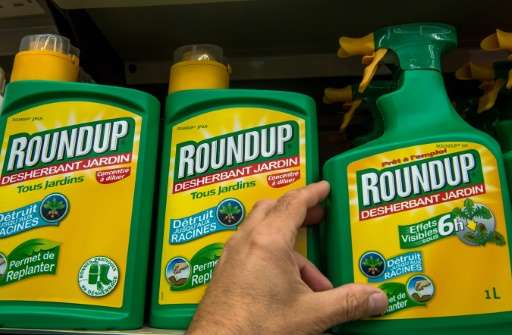EU delays weedkiller decision amid cancer uproar

The EU postponed a decision Tuesday on whether to extend the approval of a key weedkiller ingredient for another 15 years amid an international uproar that it may cause cancer.
Glyphosate was first used in the 1970s as the active ingredient in the Monsanto herbicide Roundup, and is now made generically around the world.
Regulators from the 28 EU members states, in addition to the European Commission, met over two days to decide the issue, but failed to find a decisive majority to either greenlight or reject the glyphosate re-approval.
A European commission official who spoke under condition of anonymity told AFP that the meeting ended without a decision and that "member states' discussions will be continued at a next meeting of the committee."
There is time for further discussions "as the deadline for any decision on a possible re-authorisation of glyphosate is the end of June," the source added.
The commission, the EU's executive arm, deeply angered activists in November after its European Food Safety Agency published a report that said the chemical was "unlikely" to cause cancer, paving the way for re-approval.
The finding by the EU agency was a major win for Monsanto, which has lobbied hard to keep glyphosate off the EU's list of unsafe chemicals.
It also ran afoul to the UN's International Agency for Research on Cancer, which said last year that Roundup and similar products containing glyphosate were "probably" carcinogenic.
"Despite the UK and the European Commission lining up to protect Monsanto's interests, governments across Europe have refused to treat their people as lab-rats and approve a new licence for glyphosate," Alice Jay, campaign director for the Avaaz activist group said after the decision was delayed.
Socialist MEP Pavel Poc called the deferment "a big victory for our group and for citizens" and called for further scrutiny.
In a blog post, Monsanto Europe firmly backed the EU's findings as "rigorous and transparent".
"We expect this process to move forward in the coming weeks and that a vote of member states will take place in due course," it said.
Keeping glyphosate legal is especially important for Monsanto as it looks to expand worldwide sales of its genetically modified crops, which are specifically engineered to resist glyphosate-based products.
This allows farmers to apply the product to fields much more indiscriminately to kill weeds.
The next meeting of the committee tasked with the decision is scheduled for May 18.
© 2016 AFP



















